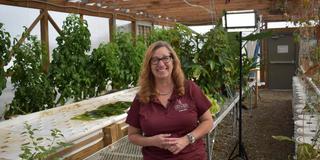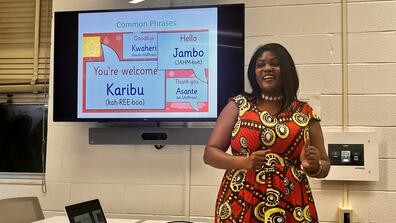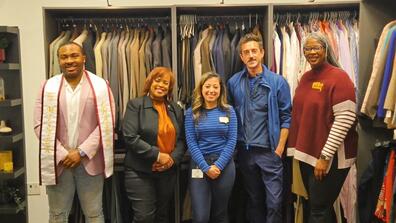Q&A: USDA Partnerships for Climate-Smart Commodities Project

Central State University, in partnership with Ohio State University and A&B Porteus Farms, has been awarded a $5 million grant over five years from the United State Department of Agriculture's Partnerships for Climate-Smart Commodities Project. The purpose of the partnership award is to build markets for climate-smart commodities and invest in America’s climate-smart producers to strengthen U.S. rural and agricultural communities.
This project will work with 20 farmers in Ohio and southeastern Michigan and provide integration of research and Extension outreach for applicable research that can be used by farmers.
CSU's Cindy Folck, Ph.D., interim associate Extension administrator, is a co-project director, along with Ibrahim Katampe, Ph.D., and Robert Korir, Ph.D.
Communications and Media Specialist Cyril Ibe, Ph.D., submitted a list of six questions to Folck, and her responses follow below. They have been lightly edited for length and clarity.
Q: The Climate-Smart grant will recruit and enroll underserved farmers in Ohio and southeastern Michigan for the project. Who is considered the “underserved” population in this sense?
A: The grant is focused on supporting underserved farmers to incorporate climate-smart technologies in their farms. These are farmers who are members of a socially disadvantaged or veteran population, such as:
- American Indians or Alaskan Natives.
- Asians.
- Blacks or African Americans.
- Native Hawaiians or other Pacific Islanders.
- Hispanics.
- Military veterans.
Q: What should farmers, producers, and ranchers know or do to become involved in the project?
A: We are encouraging farmers interested in learning more about participating in the grant to reach out to us for more information. This project will utilize manure as a natural fertilizer starting in fall 2024 through 2028. Urban and rural, socially disadvantaged, and veteran farmers are encouraged to be part of the project. The objective is to measure, quantify, and verify the carbon and greenhouse (GHG) benefits associated with these practices and to determine the marketing and economic viability of the produce. Farmers who want to learn more about participating can complete an interest form at https://forms.office.com/r/259cEAYdpA.
Q: What set of criteria would have to be met by anyone to be recruited?
A: Farmers who participate in the project will need to:
- Provide at least 3,000 square feet of plot space for four years.
- Provide one plot for manure-applied fertilizer.
- Provide one plot for conventional fertilizer.
- Register the farm, if not already done, with the USDA Farm Service Agency to obtain a farm identification number.
- Obtain historical records for the plot areas for two growing years prior to the grant.
During the grant period, both plots will be no-till, cover crop, or drip-irrigated.
Q: The project will require that you collect some data from participating farmers, producers, and ranchers. How are you going to go about this?
A: Through the grant funds, CSU will be hiring staff to help farmers with the project. The staff will be collecting data and train farmers to collect other data as needed.
Q: How will participating farmers stay engaged in the project and implementation of the expected climate-smart technologies?
A: Farmers who participate in the project during the four years will receive the following incentives for their time and efforts:
- Inputs for growing identified vegetable crops (estimated at $3,437.63 per acre. For example, 3,000 square feet would equate to $236.75).
- Seeds/seedlings for three crops during the growing season.
- Lime.
- Conventional fertilizer.
- Manure-based fertilizer.
- Organic pest and plant disease management products.
- Drip irrigation.
- Mulch.
- Cover crop seeds.
- Produce grown in space to sell.
- Annual incentive based on size of plots calculated from $1,322 per acre. For example, 3,000 square feet would equate $91.05/year.
- Expertise from CSU Extension for crop production and management.
Q: How do you plan to engage the farmers who sign up for the project to stay committed over the five-year period?
A: The cohort of farmers involved with the research project will be vital to helping identify how climate-smart technologies can be sustainable for a farm. We will keep them posted about the research findings with regular meetings and check-ins to foster networking among farmers.
For more information or questions about the project, contact Katampe at ikatampe@centralstate.edu or Folck at afolck@centralstate.edu.


